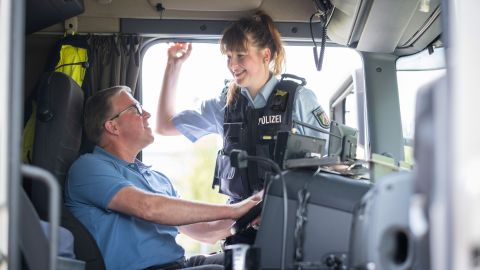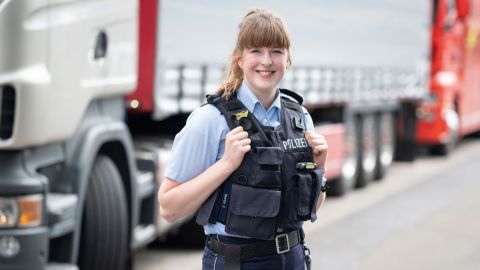If you're a regular on the highway, you've already seen it: trucks parked in the entrances and exits of rest areas or even on the hard shoulder and in emergency stop bays. This is an everyday occurrence in Germany, as there are far too few parking spaces for trucks. In their distress, drivers park their trucks illegally, risking not only their own safety but also that of others. "The high-visibility vest over the exhaust or the hazard warning lights are then supposed to prevent someone from driving into the parked trucks. But you can't relax and sleep in a situation like this," says police inspector Vanessa Kuhlage about the ghost parkers. The 23-year-old completed her bachelor's degree at the University of Applied Sciences for Police and Public Administration (HSPV) NRW in Münster last year. The topic of her thesis: truck parking shortages. "There is a shortage of around 35,000 parking spaces in Germany and there are more and more trucks on the roads."
At the end of their working day, many truck drivers spend a long time looking for a suitable parking space. This leads to fatigue and thus increases the risk of causing a road accident. "Microsleep is widespread among truck drivers," says Kuhlage. She knows their dilemma inside out. Her father has a transport company and drives trucks himself, just like her grandfather used to. He has since specialized in transporting marine furniture, mostly to the sea in Holland. "I grew up with trucks and helped out from an early age," says the young policewoman. She also used to drive with her dad from time to time. "We sometimes had to drive to ten rest stops in the evening until we found a free parking space for the truck."
The shortage of parking spaces has been acute for decades, but previous studies on the truck parking situation have shown clear weaknesses. Accidents involving ghost parkers, for example, are not recorded separately. This is one of the reasons why Kuhlage conducted an online survey for her bachelor's thesis, in which 146 truck drivers took part. 94 percent of those surveyed stated that the lack of parking spaces for trucks was a major or absolute traffic hazard. In some cases, it was already impossible to find a safe parking space after 5 pm. 83 percent stated that they had already been wrongly parked. As many as 64 percent had microsleeps. The figures illustrate the danger posed by the lack of truck parking spaces. For the police, this sometimes means a conflict of conscience. Truck drivers who park incorrectly must be sent on their way, even if this means they do not comply with the prescribed driving and rest times. This is regulated by the so-called emergency clause. "A shortage of parking spaces does not justify wrong parking. But most police officers are understanding and therefore tolerate some things as long as no one is endangered," explains Kuhlage.
In her bachelor's thesis, she also identified possible solutions and evaluated the 5-point plan for better truck parking from the Federal Ministry for Digital and Transport (BMDV). For example, it makes sense to create new parking spaces in industrial areas near the highway. Telematic parking procedures can help to park trucks behind and next to each other without gaps according to their departure times. Kuhlage: "The parking space can be increased by up to 50 percent with the same amount of available space." Parking guidance systems that record information about truck parking spaces online in real time can also be a good solution. However, it is not possible to use such apps while driving and the parking space you are looking for may already be occupied when you arrive.
Like Vanessa Kuhlage's father, the logistics companies and truck drivers she spoke to were delighted that she had tackled the problem. And her work was recognized. The German Road Safety Council (DVR) awarded her first place in the DVR sponsorship prize. But for Kuhlage, the greatest praise is when the issue receives attention and road safety increases as a result. She has now been working at the police station in Coesfeld for a year. But she is still concerned about the lack of parking spaces for trucks. She was recently part of the regulars' table for long-distance drivers in Münster on the subject of ghost parking. Here, police officers exchange ideas with truck drivers. "If we keep at it, the situation will hopefully be defused," says Kuhlage. "It's already working much better in our neighboring countries." Europe's best truck parking area is in France.

